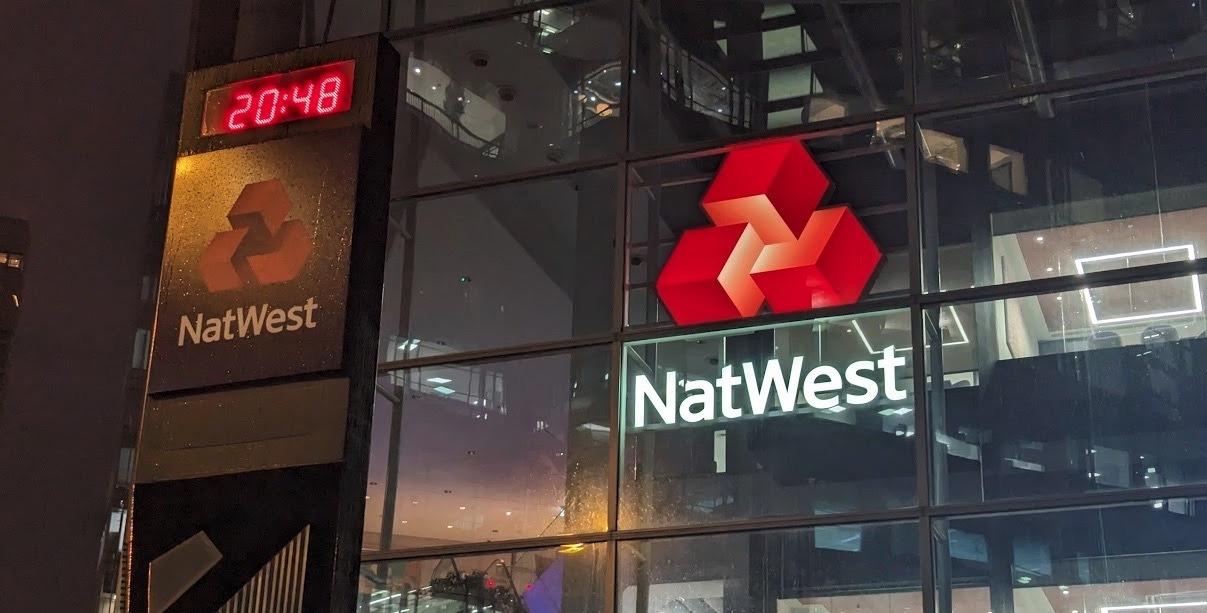NatWest shares fall amid poor profit outlook and Farage report

(credit: George Iordanov-Nalbantov)
Royal Bank of Scotland-owner NatWest’s share price took a sharp dive, marking their most significant drop since the Brexit referendum, following the bank’s lowered profit forecast for the year.
This decline was further compounded by the release of a highly scrutinised report by Travers Smith law firm regarding the bank’s dealings with Nigel Farage.
On Friday, the law firm’s review asserted that while NatWest’s choice to terminate its relationship with Mr Farage was mainly commercial and in line with its policies, the bank’s communication regarding the decision was inadequate. This miscommunication was further amplified when Mr Farage’s complaint was poorly handled.
According to the report, Coutts “failed to treat him fairly”. To ensure comprehensive transparency, Travers Smith studied 3.7 million documents and spoke to 28 bank employees.
The unveiling of this report coincided with the disclosure of NatWest’s Q3 earnings, showing a pre-tax profit of £1.3 billion, which fell short of market predictions. In a concerning move, the bank also adjusted its lending margins guidance, indicating that the benefits from increased interest rates may have plateaued.
By early trading, the bank’s shares plummeted by nearly 18%, later stabilising at a 10% drop. At present, NatWest remains 39% government-owned.
Another significant revelation from the investigation was the inappropriate sharing of confidential Farage data by Dame Alison Rose, the bank’s former CEO, to a BBC journalist. This act likely violated data protection regulations and possibly breached other regulatory guidelines. The Financial Conduct Authority announced their investigation into this matter.
A statement released by the FCA read: “In recent weeks, we have confirmed to both firms that we are now reviewing how the firms’ governance, systems and controls are working to identify and address any significant shortcomings. This supervisory work will include use of our statutory information gathering powers, interviews with relevant bank staff and reviews of appropriate policies or procedures.
“This will also include how these issues may impact on the wider fair treatment of customers. Any complaints about handling of individual cases remain a matter for the Financial Ombudsman Service, with which we cooperate.”
Addressing the controversy, NatWest Chair Sir Howard Davies expressed the bank’s apologies to Mr Farage and acknowledged their shortcomings. He assured that the bank would make “substantive changes” to its protocols.
In response to the report’s recommendations, NatWest committed to ensuring that the legally protected beliefs or opinions of its clients would not influence their banking decisions. They also pledged to reevaluate their treatment of politically exposed individuals, who often face increased challenges in accessing banking services.
While Dame Alison Rose’s remuneration for 2023 remains undecided, prior to her exit, she would have been entitled to a package potentially worth £5.3 million, and she currently possesses 2.6 million unvested shares, valued at around £5.4m.
Commenting on the bank’s Q3 results, CEO Paul Thwaite, commented: “Today’s results show that NatWest is a strong bank which is performing well, generating sustainable profits and returns. This performance is built on the foundations of strong customer franchises and a robust balance sheet with high levels of liquidity and a well-diversified loan book.
“As a result, credit losses and impairments remain low and we are ready and able to stand by our customers and businesses through the current economic uncertainty.”









